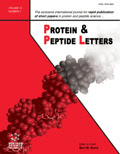
PROTEIN AND PEPTIDE LETTERS
metrics 2024
Advancing molecular insights through protein and peptide research.
Introduction
PROTEIN AND PEPTIDE LETTERS is a prominent peer-reviewed journal published by Bentham Science Publishers Ltd, specializing in the dynamic fields of biochemistry and structural biology. With an ISSN of 0929-8665 and a corresponding E-ISSN of 1875-5305, the journal has been a pivotal platform for researchers since its inception in 1994. Spanning various aspects of protein and peptide research, it aims to disseminate groundbreaking findings that enhance our understanding of molecular mechanisms and therapeutic applications. Although categorized in the Q3 quartile for biochemistry and medicine, and Q4 in structural biology within the 2023 metrics, it remains a valuable resource in the academic arena, offering insight into the latest research and advancements. As the journal converges towards its 2024 milestone, it continues to reflect the evolving landscape of molecular research. While it currently does not offer open access, the accessibility to its impactful content is essential for students, professionals, and researchers invested in these critical scientific disciplines.
Metrics 2024
 0.35
0.35 1.00
1.00 1.50
1.50 67
67Metrics History
Rank 2024
Scopus
IF (Web Of Science)
JCI (Web Of Science)
Quartile History
Similar Journals

MOLECULAR AND BIOCHEMICAL PARASITOLOGY
Diving Deep into the Genetics of Parasitic Organisms.MOLECULAR AND BIOCHEMICAL PARASITOLOGY is a renowned journal published by Elsevier, focusing on the crucial intersections of molecular biology and parasitology. Since its inception in 1980, this journal has aimed to advance our understanding of parasitic organisms at the biochemical and molecular levels, providing a dedicated platform for researchers studying host-parasite interactions, parasite genetics, and diagnostic methodologies. Although it currently holds a quartile status of Q4 in Molecular Biology and Q3 in Parasitology for the year 2023, it remains a vital resource within the academic community, boasting a variety of research articles, reviews, and case studies that explore innovative treatment strategies and the molecular biology of parasites. Researchers and students alike can benefit from the journal's contributions to the field, despite its traditional publishing model, as the content remains pivotal for ongoing studies and advancements in parasitology.

PROTEIN JOURNAL
Unveiling Innovations in Protein ResearchProtein Journal, published by Springer, stands as a significant academic resource in the fields of Analytical Chemistry, Biochemistry, Bioengineering, and Organic Chemistry. Since its inception in 1996, the journal has dedicated itself to the dissemination of high-quality research focused on protein chemistry and its biomedical applications. With an impressive impact reflected in its classification as a Q2 journal in Analytical Chemistry and Q3 in both Biochemistry and Bioengineering as of 2023, it provides an essential platform for researchers and practitioners to share their findings. The journal embraces the open-access model, enhancing accessibility to cutting-edge research. The Protein Journal is crucial for academicians, industry professionals, and students, catering to their need for rigorous scientific discourse and innovative discoveries in protein studies. With an established track record of converging over two decades of knowledge and research, it continues to influence and shape the advancements in this vital area of science.

BMC BIOTECHNOLOGY
Fostering Open Access to Cutting-edge ResearchBMC Biotechnology, a leading journal in the field of biotechnology, is published by BMC and has been a pivotal platform for open-access research since 2000. With a focus on the diverse areas of biotechnology, including biochemistry, genetics, and molecular biology, this journal holds a prestigious Q2 ranking in its category for 2023 and demonstrates a commendable percentile rank in the top 66th for its Scopus listings. Operating out of the United Kingdom and covering research from 2001 to 2024, BMC Biotechnology is committed to disseminating high-quality, rigorously peer-reviewed articles that foster advancements and innovations in the biotechnology landscape. Researchers, professionals, and students alike will benefit from the journal's rich content and dedicated commitment to enhancing scientific discourse within the realm of biotechnology.

Peptide Science
Innovative insights into the world of peptide chemistry.Peptide Science, published by Wiley, is an esteemed journal dedicated to advancing the understanding of peptide chemistry and its applications across various scientific disciplines, including biochemistry, biophysics, and organic chemistry. Since its inception in 2018 and continuing through 2024, this journal has provided an essential platform for the dissemination of innovative research, engaging articles, and critical reviews. With an impressive Q3 ranking in the fields of Biochemistry and Biomaterials, and a Q2 status in Biophysics and Organic Chemistry as of 2023, Peptide Science acknowledges its integral role in addressing significant scientific challenges. This open-access journal ensures that findings are readily available to a global audience, fostering collaboration and knowledge sharing among researchers, professionals, and students alike. The journal exemplifies excellence in scholarly communication, making it an essential resource for anyone interested in the intricate world of peptide research.
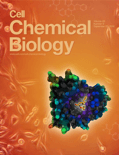
Cell Chemical Biology
Catalyzing Discoveries in Biochemistry and Beyond.Cell Chemical Biology, published by Cell Press, stands at the forefront of interdisciplinary research in the realms of biochemistry, molecular biology, and pharmacology. With a robust impact factor evident in its prestigious Q1 quartile rankings across multiple categories including Clinical Biochemistry and Drug Discovery for 2023, this journal serves as a critical platform for disseminating cutting-edge scientific discoveries. As an Open Access publication, it ensures that vital research is accessible to a wide audience, fostering collaborations and driving innovation in the life sciences. Based in the United States, and featuring publications from 2016 to 2024, Cell Chemical Biology invites researchers, professionals, and students alike to contribute to its mission of advancing knowledge through rigorous peer-reviewed articles that address both fundamental and applied aspects of chemical biology.

MOLECULAR BIOLOGY
Advancing the Frontiers of Molecular DiscoveryMOLECULAR BIOLOGY, published by PLEIADES PUBLISHING INC, serves as a vital repository for the dissemination of innovative research within the fields of biochemistry, genetics, and molecular biology. With an ISSN of 0026-8933 and an E-ISSN of 1608-3245, this journal has been a mainstay in the scientific community since its inception, embracing its deep historical roots from 1971 to the present. Recognized for its qualitative contributions, MOLECULAR BIOLOGY is ranked in the Q3 quartile for Biophysics and Q4 for Structural Biology, placing it among select journals in its domain. Researchers and students alike benefit from its rigorous peer-reviewed articles, which focus on all aspects of molecular mechanisms and interactions. The journal's inclusion in prestigious databases underlines its commitment to academic excellence. The editorial board is dedicated to fostering the sharing of influential findings, making it an essential resource for advancing knowledge and innovation in molecular biology.

JOURNAL OF BIOLOGICAL CHEMISTRY
Advancing the Frontiers of Biochemical ResearchJOURNAL OF BIOLOGICAL CHEMISTRY, published by Elsevier, is a premier interdisciplinary journal dedicated to advancing our understanding of biochemistry, cell biology, and molecular biology. With a prestigious history dating back to 1945 and an impressive convergence of research expected to continue through 2024, this journal holds a Q1 ranking in all three of its core categories, signaling its critical influence in the respective fields, supported by a robust Scopus ranking that places it among the top echelons of internationally recognized research. Although currently not available as Open Access, the journal is essential for researchers and professionals looking to stay abreast of the latest breakthroughs and innovations in biochemical research. With a deep commitment to scientific rigor and a focus on diverse topics ranging from cellular processes to molecular mechanisms, the Journal of Biological Chemistry serves as a vital resource for the academic community, shaping the future of biological sciences.
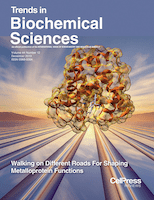
TRENDS IN BIOCHEMICAL SCIENCES
Shaping the Future of Biochemical SciencesTRENDS IN BIOCHEMICAL SCIENCES is a premier academic journal published by CELL PRESS, focusing on the latest advancements and insights in the dynamic fields of biochemistry and molecular biology. With an ISSN of 0968-0004 and an E-ISSN of 1362-4326, this journal has established itself as a leading source of high-impact research, boasting an impressive Q1 category ranking in both Biochemistry and Molecular Biology as of 2023. The journal's Scopus Ranks further highlight its significance, placing it in the top 3% and 4% of its respective fields, emphasizing its role as a vital platform for disseminating innovative research. Published since 1976 and continuing through 2024, TRENDS IN BIOCHEMICAL SCIENCES provides a comprehensive overview of the latest trends, methods, and applications, helping researchers, professionals, and students stay at the forefront of their disciplines. Although it offers traditional access options, the journal's rich content and authoritative analysis make it a must-read for those pursuing cutting-edge biochemical research.
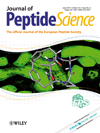
JOURNAL OF PEPTIDE SCIENCE
Discovering the intricacies of peptide synthesis and function.JOURNAL OF PEPTIDE SCIENCE, published by Wiley, is a vital resource for researchers and professionals in the fields of biochemistry, drug discovery, and molecular biology. Established in 1995 and encompassing research through 2024, this journal provides a platform for disseminating cutting-edge studies related to peptide synthesis, structure, function, and applications in therapeutics. Although it currently does not offer open access, its robust content has earned it a respectable Q3 ranking in several categories, including biochemistry and pharmacology, according to the latest metrics. Researchers will find significant insights linked to peptide chemistry and its implications in medical sciences, making the JOURNAL OF PEPTIDE SCIENCE an essential addition to academic libraries and for those passionate about peptide research and its potential breakthroughs.
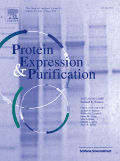
PROTEIN EXPRESSION AND PURIFICATION
Advancing Techniques in Protein Expression and PurificationPROTEIN EXPRESSION AND PURIFICATION, published by Academic Press Inc. Elsevier Science, is a premier journal in the field of biotechnology. With its ISSN 1046-5928 and E-ISSN 1096-0279, the journal has been a vital source of knowledge since its inception in 1990 and continues to provide high-quality research up to 2025. Though categorized in the third quartile (Q3) for 2023 within its scope of biochemistry, genetics, and molecular biology, it serves as a valuable platform for scientists and researchers focusing on the latest advancements in protein expression methodologies and purification techniques. The journal enjoys a respectable Scopus rank of 177 out of 311 in its category, representing a 43rd percentile position that underscores its impact in the research community. While not an Open Access journal, it offers a wealth of insights that can significantly enhance one's understanding of protein biochemistry, making it a must-read for professionals and students alike engaged in this dynamic field.